
Semantics & Pragmatics
Scope & Guideline
Exploring the Depths of Meaning and Context
Introduction
Aims and Scopes
- Exploration of Modalities:
The journal frequently publishes works that delve into various modalities such as necessity, possibility, and their implications in linguistic contexts. - Pragmatic Enrichment:
Research on how context influences the interpretation of meaning, including the role of implicature and presupposition in communication. - Cross-linguistic Studies:
The journal encourages contributions that examine semantic and pragmatic phenomena across different languages, providing insights into universal and language-specific mechanisms. - Formal Semantics and Pragmatics:
It emphasizes rigorous formal approaches to semantics and pragmatics, integrating tools from logic and computational models to analyze linguistic data. - Interdisciplinary Approaches:
The journal promotes interdisciplinary research that intersects with cognitive science, philosophy, and psychology, particularly in understanding language processing.
Trending and Emerging
- Probabilistic Pragmatics:
There is a growing interest in probabilistic models that account for how speakers and listeners use statistical reasoning in pragmatic inference, indicating a trend toward integrating formal models with real-world communication. - Context Dynamics:
Research focusing on the dynamics of context in communication is trending, exploring how context evolves and affects meaning over time, especially in interactive settings. - Intensional Anaphora and Reference:
Emerging studies on intensional anaphora highlight the complexities of reference and meaning in various linguistic contexts, suggesting a renewed focus on how speakers manage reference in conversation. - Social and Cognitive Influences on Language:
There is an increasing exploration of how social stereotypes and cognitive factors influence language use and interpretation, bridging semantics, pragmatics, and social psychology. - Metalinguistic Awareness:
Research on metalinguistic phenomena, such as metalinguistic gradability and quotation, is becoming more prominent, reflecting a deeper inquiry into how language reflects and shapes thought.
Declining or Waning
- Traditional Syntax-Semantics Interface:
There appears to be a decline in papers focusing solely on the syntax-semantics interface without considering pragmatic implications, reflecting a broader trend towards integrated approaches. - Static Semantics:
Research that emphasizes static, context-independent semantics may be waning, as the field increasingly recognizes the importance of dynamic and context-sensitive interpretations. - Literal vs. Non-Literal Distinctions:
The distinction between literal and non-literal language use is receiving less focus, with more emphasis now placed on the complexities of meaning in context rather than simple categorization.
Similar Journals
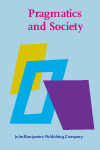
Pragmatics and Society
Innovative Research at the Crossroads of Linguistics and SocietyPragmatics and Society, published by John Benjamins Publishing Co, is an esteemed journal that serves as a vital platform for the interdisciplinary exploration of language use in social contexts. Established with the aim of bridging the gap between pragmatics and social theory, this journal covers innovative research and critical methodologies within linguistics and language studies. With an impressive impact factor and recognition as a Q2 journal in the field of Linguistics and Language for 2023, it ranks notably within the 75th percentile for Arts and Humanities and 73rd for Social Sciences. Based in the Netherlands, Pragmatics and Society is dedicated to fostering scholarly discussions and advancing knowledge in areas such as discourse analysis, sociolinguistics, and communicative practices. Researchers, professionals, and students alike will find this journal to be an invaluable resource for understanding the complexities of language in society and are encouraged to engage with its rigorous publications.

International Review of Pragmatics
Advancing the Understanding of Human CommunicationInternational Review of Pragmatics is a leading scholarly journal published by BRILL, renowned for its contribution to the fields of Communication, Linguistics and Language, and Psychology. With an ISSN of 1877-3095 and an E-ISSN of 1877-3109, this journal offers a rigorous platform for high-quality research and theoretical contributions that explore the complexities of pragmatics across various domains. Situated in the Netherlands, the journal is currently ranked in the Q2 quartile for both Communication and Linguistics, reflecting its substantial influence and academic excellence. The Scopus rankings further emphasize its importance, with percentile rankings in the 55th to 78th range across several relevant categories. Since its inception in 2014, the journal has consistently pursued the objective of fostering interdisciplinary dialogue and advancing scholarly discourse in pragmatics. Although the journal does not currently offer open access options, it remains committed to accessibility in academia through various channels. Researchers, professionals, and students alike will find valuable insights and contemporary discussions that propel the field forward, making International Review of Pragmatics an essential resource for those dedicated to understanding the intricacies of human communication.
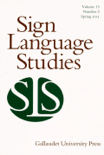
Sign Language Studies
Empowering voices through sign language scholarship.Sign Language Studies is a prestigious peer-reviewed journal dedicated to advancing the field of sign language research and the linguistic studies surrounding it. Published by Gallaudet University Press, this journal stands out in the realms of Linguistics and Language, being classified within the Q2 category as of 2023, which underscores its influence and relevance within academic circles. Operating under the ISSN 0302-1475 and E-ISSN 1533-6263, the journal has a remarkable Scopus ranking that positions it in the top 20% within the disciplines of Arts and Humanities and Social Sciences, attesting to the high quality and impact of its publications. Spanning a comprehensive timeline from 2002 to 2024, Sign Language Studies invites researchers, professionals, and students to engage with cutting-edge research, theoretical frameworks, and practical studies that contribute to our understanding of sign languages, their structure, use, and the communities they serve. This makes it an essential resource for those committed to the exploration and appreciation of sign language within both linguistic and social contexts.

Contrastive Pragmatics
Exploring the nuances of language and culture.Contrastive Pragmatics, published by BRILL, is a premier open-access journal dedicated to advancing the field of linguistics through a unique focus on the pragmatic aspects of language comparison and contrast. Since its inception in 2020, this journal has rapidly established itself as a vital resource for scholars interested in the intricate interplay between language use, culture, and communication, reflecting the increasing importance of pragmatics in understanding cross-linguistic phenomena. With its Q2 ranking in Linguistics and Language as of 2023, and its commendable positions within Scopus ranks, Contrastive Pragmatics offers a platform for innovative research that not only highlights theoretical developments but also invites empirical investigations across languages and cultures. The journal's commitment to open access ensures that cutting-edge research is freely available, fostering collaboration and knowledge sharing among researchers, professionals, and students alike. For those looking to stay at the forefront of linguistic research, Contrastive Pragmatics is an essential avenue for exploration.
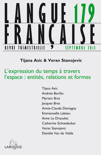
LANGUE FRANCAISE
Fostering Innovation in Language ResearchLANGUE FRANCAISE, published by LAROUSSE, stands as a premier journal in the realm of linguistics and language studies, boasting an impressive Q1 quartile rating in the 2023 Linguistics and Language category. With its international reputation anchored in France, this journal presents critical research and discussions that advance our understanding of the French language, its structures, usage, and evolution. Although not an open-access publication, LANGUE FRANCAISE is indexed with an ISSN of 0023-8368 and an E-ISSN of 1957-7982, reflecting its scholarly credibility and impact, including Scopus rankings that place it competitively in the fields of arts and humanities as well as social sciences. This journal serves as an essential resource for researchers, practitioners, and students aiming to deepen their knowledge and engage in scholarly debates that shape contemporary linguistic thought. The journal's commitment to high-quality research continues to foster an enriching academic environment and contribute to the dynamic discourse surrounding language and linguistics.

Fluminensia
Illuminating the Intersection of Linguistics and LiteratureFluminensia, published by the University of Rijeka, Faculty of Philosophy, is a distinguished open-access journal that has been contributing to the fields of Linguistics and Literature since its inception in 1999. With an ISSN of 0353-4642 and an E-ISSN of 1848-9680, this journal offers rigorous peer-reviewed articles, fostering an engaging platform for researchers, professionals, and students alike. Recognized internationally, it holds a Q3 ranking in Linguistics and Language and a Q2 ranking in Literature and Literary Theory for 2023, reflecting its significant impact within these fields. Based in Croatia and serving a global academic community, Fluminensia aims to explore innovative theories and methodologies, promoting critical discourse and scholarly exchange. Researchers will find its broad scope inviting, bridging insights across various disciplines in the arts and humanities. Accessible to all, this journal continues to foster an inclusive academic landscape, ensuring that valuable research is widely disseminated and freely available.
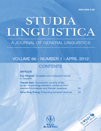
STUDIA LINGUISTICA
Championing Scholarly Excellence in LinguisticsSTUDIA LINGUISTICA is a prestigious journal published by Wiley, focusing on the dynamic and multifaceted fields of Linguistics and Language. With an ISSN of 0039-3193 and an E-ISSN of 1467-9582, the journal has been a vital resource for academics since its inception in 1947, diligently converging insights from history and philosophy of science alongside contemporary linguistic research. Demonstrating excellent scholarly impact, STUDIA LINGUISTICA proudly holds a Q1 ranking in Linguistics and Language as well as a Q2 in History and Philosophy of Science as of 2023, indicating its significance within these academic domains. Furthermore, it ranks in the top percentiles among similar journals, with a commendable 73rd percentile in Language and Linguistics and 70th in related social sciences. Although it does not offer Open Access, its contribution to the discourse of language studies is underpinned by rigorous peer-review processes and commitment to advancing theoretical and empirical research. For researchers, professionals, and students alike, STUDIA LINGUISTICA remains an essential platform for disseminating impactful linguistic scholarship worldwide.
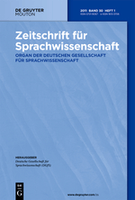
Zeitschrift fur Sprachwissenschaft
Advancing the frontiers of linguistic research.Zeitschrift für Sprachwissenschaft, published by DE GRUYTER MOUTON, is a leading journal in the field of linguistics that has been contributing to scholarly discourse since its inception in 1982. With an ISSN of 0721-9067 and an E-ISSN of 1613-3706, the journal offers an Open Access model since 2017, ensuring widespread dissemination of research findings. Positioned in Q2 of the Linguistics and Language category for 2023, it ranks #312 out of 1088 in the Arts and Humanities and #370 out of 1167 in Social Sciences, reflecting its robust impact and contribution to the field. This German-based journal covers a diverse range of topics related to language and linguistics, appealing to researchers, professionals, and students alike. By fostering interdisciplinary dialogue and showcasing innovative research, Zeitschrift für Sprachwissenschaft plays a critical role in advancing our understanding of language in various contexts. The journal is located at Genthiner Strasse 13, 10785 Berlin, Germany, inviting scholars globally to contribute to its mission of enhancing linguistics research.
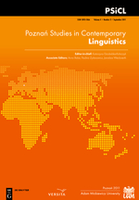
Poznan Studies in Contemporary Linguistics
Advancing understanding in contemporary linguistics.Poznan Studies in Contemporary Linguistics, published by DE GRUYTER MOUTON, is a pivotal journal in the field of linguistics, with an ISSN of 0137-2459 and an E-ISSN of 1897-7499. Located in Germany, this esteemed journal has consistently contributed to the academic landscape since its inception. As of 2023, it holds a Q2 category rank in Linguistics and Language and boasts commendable Scopus rankings, featuring in the 69th percentile for Arts and Humanities and the 66th percentile for Social Sciences. The journal emerges as a vital platform for scholars to explore contemporary linguistic theories and practices, making it an essential resource for researchers, professionals, and students alike. With a converged publication period from 2007 to 2024, it aims to facilitate a deeper understanding of linguistic advancements and trends. While the journal currently does not offer open access, its rigorous peer-review process ensures the highest quality of published research, strengthening its role as a leading discourse in the dynamic field of linguistics.

Studia Semiotyczne
Connecting Scholars through Open Access ResearchStudia Semiotyczne is a prominent academic journal dedicated to the interdisciplinary study of semiotics, linguistics, and philosophy, published by the esteemed Polskie Towarzystwo Semiotyczne. With its ISSN 0137-6608 and E-ISSN 2544-073X, this journal has established itself as an essential platform for scholars in these fields. Since transitioning to Open Access in 2010, Studia Semiotyczne provides unrestricted access to groundbreaking research, thereby fostering scholarly exchange and collaboration globally. The journal has been recognized in the Q2 category in both Linguistics and Language and Philosophy in 2023, reflecting its quality and impact in these disciplines. By covering a range of topics within semiotics and related studies, it aims to advance understanding and stimulate dialogue among researchers and practitioners alike, making it an indispensable resource for those seeking to explore the complexities of meaning and communication in contemporary society.